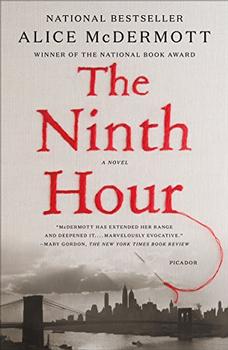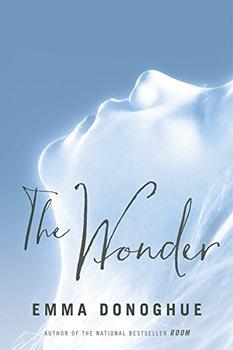Summary | Excerpt | Reading Guide | Reviews | Beyond the book | Read-Alikes | Genres & Themes | Author Bio

The turn of the millennium was a confusing time. There were cries of potential chaos as the world edged closer to 2000, but there were also those voices that insisted that life would continue, and that everything would be okay.
Andrew Roe's debut adult novel, The Miracle Girl, is set in this era of uncertainty, and life is definitely full of that chaos for the Vincent family. Eight-year-old Anabelle Vincent is the titular character, and injured in an accident, she rests in a comatose state. Around her, life happens. Karen, Anabelle's mother, struggles to provide around-the-clock care for her daughter, and when she does manage to leave the house, something bad happens which reaffirms her destiny: "I can't ever leave her." John, Anabelle's father, flees because of guilt (and selfishness). He seems to struggle with his decision, but we learn that he made up his mind a long time ago. Life is hard.
The Miracle Girl is certainly dark, and even hopeless, in sections. However, like the time from which this story stems, Roe gives us a dualistic narrative as he balances this darkness with an abundance of light.
Much of this light comes from Anabelle's visitors. These gazers from around the country claim that she creates miracles. As we learn about one woman's visit: "She came because of her son, who was in a motorcycle accident. The doctors told her he wouldn't be able to walk again. She came to see Annabelle and then when she got home, there was her son, waiting for her at the door, without the crutches he'd been using since the accident. Said he just had a feeling that he could walk again." Perhaps Anabelle really is a miracle worker. Is her suffering worth something if others are healed?
The Miracle Girl will likely attract a number of religious readers. Roe's presentation of Anabelle as a Christ-like figure is fairly straightforward – her suffering brings salvation to many of those around her. But there are doubters too, even as countless miracles occur. One particular skeptic adamantly proclaims that the miracles "can be rationally, scientifically explained." Again though, Roe presents a dualistic narrative – just as one miracle is possibly rationally explained, another reaffirms Anabelle's possible powers.
Roe explores the concept of the American celebrity too. Karen, who is an emotionally and physically exhausted mother, is also a tabloid darling. During one brief outing, a fan approaches her and says, "I've seen you and your daughter on TV. The Miracle Girl. Wow. And you're the mom of the Miracle Girl. And you're here, at Costco, you're here too. Wow. Could I get your autograph?" She plays along with her admirers like all good celebrities do. However, the pain behind her smile is obvious.
The style Roe employs here is delicately balanced. His language is plain without being pretentiously derisive. The balance of perspectives, from daughter to mother to father to visitor, is consistent. The narrative is confidently told, and it glides along smoothly, free of bumps or bruises. Moving from chapter to chapter, I felt like I was in good hands. I didn't expect any sudden surprises or twists, and, thankfully, I didn't get any. Book club leaders, clear your calendars. Andy Roe has crafted a novel that will inspire hours of discussion and dissection. The Miracle Girl is an audacious novel that fully captures the zeitgeist of pre-millennium America.
![]() This review was originally published in The BookBrowse Review in April 2015, and has been updated for the
March 2016 edition.
Click here to go to this issue.
This review was originally published in The BookBrowse Review in April 2015, and has been updated for the
March 2016 edition.
Click here to go to this issue.

If you liked The Miracle Girl, try these:

by Alice McDermott
Published 2018
Rendered with remarkable lucidity and intelligence, Alice McDermott's The Ninth Hour is a crowning achievement of one of the finest American writers at work today

by Emma Donoghue
Published 2017
In Emma Donoghue's latest masterpiece, an English nurse brought to a small Irish village to observe what appears to be a miracle - a girl said to have survived without food for months - soon finds herself fighting to save the child's life.
Your guide toexceptional books
BookBrowse seeks out and recommends the best in contemporary fiction and nonfiction—books that not only engage and entertain but also deepen our understanding of ourselves and the world around us.